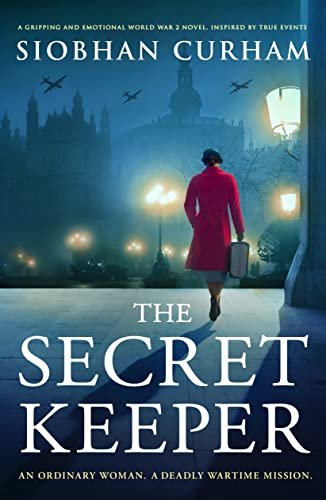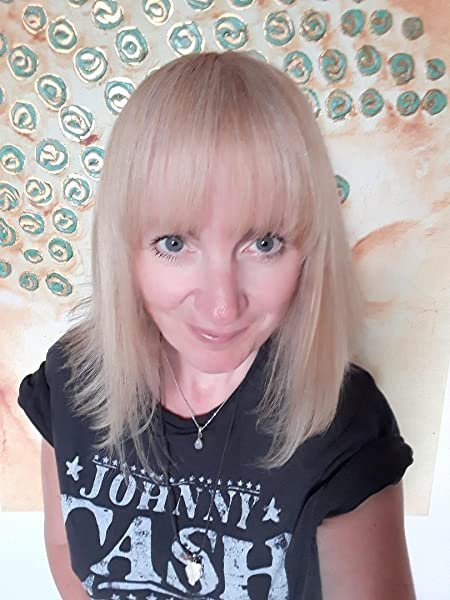Interview with Siobhan Curham - author of 'The Secret Keeper'
Interview with Siobhan Curham - Author of The Secret Keeper
Novel release date: July 27th, 2022
📖
Welcome Siobhan! Please share the inspiration behind The Secret Keeper and a brief overview of the story.
I always try and come up with a fresh angle on World War 2 in my historical novels and after I read the real life story of the American model turned spy Aline Griffith, I thought it would be interesting to write about a spy in Madrid during the war. I hadn’t realised that Spain was such a hotbed of spying and intrigue during the war so I’m hoping that even seasoned readers of WW2 fiction will learn something new through the novel. When I was still researching for the book I found an old training video for recruits to the American intelligence agency the OSS (the fore-runner for the CIA). This led me to wonder about the actors in the video and I discovered that one of them was the Hollywood star, William Holden. I had no idea that Hollywood played such a key role in the war and that the Hal Roach Studio was turned into the First Motion Picture Unit, where directors, screen-writers and actors as well known as James Stewart and Ronald Reagan were recruited to make propaganda movies and training videos for the war effort. And so my heroine, Elena Garcia, was born. A young actress trying to make it in Hollywood, who gets recruited to the OSS after starring in a training video, and is sent to work undercover in Nazi occupied Europe.
What four words would you use to describe Elena? Does spy work and acting have anything in common?
I would describe Elena as feisty, loyal, brave and loving. I instantly saw parallels between acting and working as a spy, especially the type of undercover work women were called to do during the war. In the novel, Elena has to get very close to someone who’s suspected of being Himmler’s agent in Madrid and another known Nazi. Pretending to like them requires all of her acting skills. She also approaches the different personas she has to adopt as a spy in the same way she would prepare for a character in a film, coming up with their backstory and working on their physicality and mannerisms etc.
What surprising facts did you learn about the spy world that you utilised in your novel?
I was surprised and hugely impressed by the courage of the female spies who risked so much in Occupied Europe. I was also really interested to discover the role the actor Leslie Howard played for the war effort. He was a huge star at the time, especially after his role in the movie Gone with the Wind. I had no idea about his work for Churchill in Spain, or that he was killed by the Luftwaffe. As soon as I discovered this I knew I had to work him into the novel. One really disappointing fact I learned was how the Gestapo were able to turn Allied spies to come and work for them in Paris, resulting in the deaths of many other allied spies and Resistance members.
Please tell us about Grand-Mere Rose and her special part in the novel?
Initially, Grand-Mere Rose was only in the novel to act as a catalyst for Elena wanting to do her part for the war effort. I really liked the idea of Elena desperately wanting to do something – anything – to help liberate her beloved grandmother from Occupied France. But once I’d finished the very first draft I felt like something was missing. I love my novels to have a deep emotional seam running through them, and in the first draft I’d been mainly focused on creating an action-packed spy plot with lots of twists and turns. I’d already mentioned that Elena treasured her letters from her grandma in France, and how much she missed them once the Germans banned the French from sending mail overseas. Then I got to thinking, what if Grand-Mere Rose carried on writing her letters to Elena as an act of defiance and the reader is able to see them? Obviously she wouldn’t have been able to post the letters but I could definitely imagine her writing them and hiding them, in the hope that Elena would one day learn what the French had to go through during the occupation. Unbeknownst to her, Elena knows only too well once she’s recruited to the OSS and sent to Europe. As soon as I decided to weave Grand-Mere Rose’s letters through the novel I felt like the whole thing fell into place. And I loved the idea of the reader being able to see the story from both sides – which neither Elena or Grand-Mere Rose are able to, as they aren’t able to communicate. I hope it ramps up the tension and the ‘will they, won’t they be reunited’ element of the story.
Who is your favourite character in The Secret Keeper and what is special about them?
I really enjoyed writing Elena, and creating a kick-ass heroine who is able to outwit Nazis and kill a man with her bare hands, but once I started writing Grand-Mere Rose’s letters, she became my favourite. Ever since I left home my dad has written me letters, imbued with the kind of wisdom Grand-Mere Rose communicates to Elena. I’ve kept every single one of them and now have drawers full to dip into whenever I need a little pick me up. It felt lovely writing a character who was a kind of tribute to my dad and to the lost art of letter writing.
What was the greatest challenge you faced in writing The Secret Keeper and why?
If I’m totally honest, The Secret Keeper was one of the hardest books I’ve ever written – and I’ve written over 40! I really wanted to challenge myself as a writer and see if I could write a spy thriller, which obviously requires a lot of plotting, and with historical fiction you have the added challenge of everything having to be based in fact. I did huge amounts of research and the book spans three different countries, America, Spain and France, so at times the enormity of it all felt overwhelming. But I’m proud I had the guts and the grit to try something different and so ambitious.
What themes or messages do you hope readers see in The Secret Keeper?
Well, the obvious message that comes to mind is the one that Grand-Mere Rose shares in her last letter to Elena before the Nazi Occupation. She knows she won’t be able to write to her grand-daughter for a long time, if ever again, so she tries to compress all of her worldly wisdom into 9 words: ‘Love your fear. Seek the wonder. Embrace the mystery.’ Elena clings to these words once she becomes a spy, reciting them to herself like a mantra. I’d love it if the reader took that message into their heart too. I truly believe that fear can only be overcome by love, and that the key to a rich and meaningful life is to keep looking for the wonder in every situation and to embrace the mystery, even in the hardest of times. Especially in the hardest of times.
Please share with us an overview of your publishing history.
My first book – a non-fiction self help book – was published in 2000, and I’ve gone on to write over 40 books for adults, young adults and children – fiction and non-fiction. It’s safe to say that I love this writing game!
When did you first discover you wanted to be a writer? Was there a book, author or an event that sparked your interest?
As a young child I was a real book worm, so to me it felt like a natural progression to want to create stories of my own. To me, reading and writing have always been a beautiful form of escape and I’ve used them to get through some very difficult times. I grew up on a council estate in London and after a few ‘wild child’ years of skiving off high school, drinking in London bars and clubs, and taking drugs I realised that if I wanted a better life for myself I was going to have to work for it. Turning my passion for writing into a career seemed like my only escape route, so when I was 16 I knuckled down and started properly studying so that I could get to university. My plan worked, but then I had a massive crisis of confidence once I got to uni and realised how posh and middle class the publishing world was. I truly couldn’t see how I’d belong or make it there. So I dropped out and went to work in a shop. Thankfully my love of writing won out in the end and I taught myself how to write when I was on maternity leave with my son and became a published author as a single mum. This is why I LOVE helping other writers achieve their dreams through my coaching, workshops and courses. I’m living proof that, no matter where you come from, you can achieve beyond your wildest dreams. And I have tons of experience in how to turn obstacles and setbacks into stepping stones!
Are you a pantser or plotter or a mix of both?
I’m a mixture of both I guess, in that I like to have a rough idea of where a book is going before I start but having said that, I never map everything out meticulously and I always leave a lot open for surprise. As Robert Frost said, ‘No surprise in the writer, no surprise in the reader.’ This can be a terrifying way of working but it’s also what makes it so exciting.
If you could time travel to the past to do research for a novel, when and where would you go? Who would you want to meet?
I would go back to World War 2 for sure, to Occupied Paris to meet members of the Resistance. Paris is one of my favourite places in the world and going there today it’s almost impossible to imagine what went on during the occupation.
What great books have you read recently you would recommend?
I’m currently reading a wonderful book called Glitter and Glue by Kelly Corrigan. It’s a memoir about the relationship between a mother and daughter but it reads like a novel and it’s so beautifully written. Corrigan is a new writer to me so I’m currently in that excited stage of wanting to consume every word she’s ever written!
Are you working on a new novel? Can you share a little of what it is about?
I’m currently working on my fifth World War 2 novel, which is about a novelist in France who ends up in Auschwitz, and the transformative power of storytelling.
Many thanks for being my guest Siobhan! I wish you much success on the upcoming release of your new novel on July 27th, 2022!
Drop by Siobhan Curham’s website for more information on her creative activities: her many books and teaching adventures.

